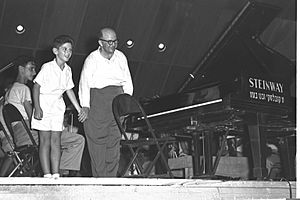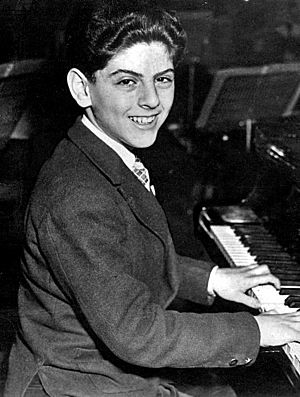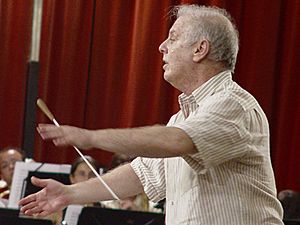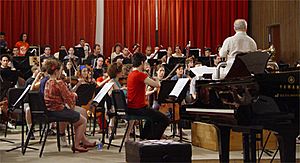Daniel Barenboim facts for kids
Quick facts for kids
Daniel Barenboim
|
|
|---|---|
| דניאל בארנבוים | |
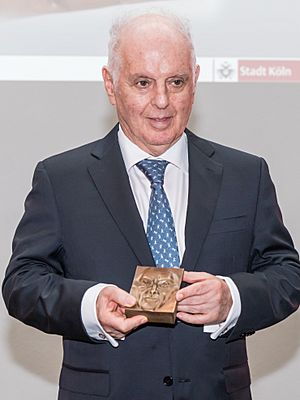
Barenboim receiving the 2019 Konrad Adenauer Prize from the City of Cologne
|
|
| Born |
Daniel Moses Barenboim
15 November 1942 Buenos Aires, Argentina
|
| Citizenship |
|
| Occupation |
|
| Years active | 1952–present |
| Spouse(s) | |
| Children | 2 |
Daniel Moses Barenboim (Hebrew: דניאל בארנבוים; born 15 November 1942) is a famous classical pianist and conductor. He was born in Buenos Aires, Argentina, and now lives in Berlin. He holds citizenship in Argentina, Israel, Palestine, and Spain.
From 1992 until January 2023, Barenboim was the main music director of the Berlin State Opera. He also led its orchestra, the Staatskapelle Berlin. Before that, he was the music director for other major orchestras like the Chicago Symphony Orchestra and La Scala in Milan.
Barenboim is well-known for creating the West–Eastern Divan Orchestra. This special orchestra brings together young musicians from Arab countries and Israel. He has also spoken out about the conflict in the Middle East. He has received many important awards for his music and his work for peace.
Contents
About Daniel Barenboim
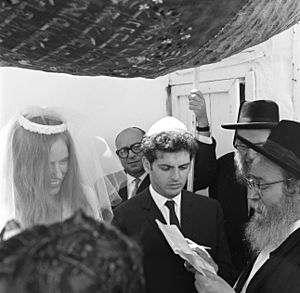
Daniel Barenboim was born on 15 November 1942 in Buenos Aires, Argentina. His parents, Aida and Enrique Barenboim, were both professional pianists. Daniel started learning piano from his mother at age five. Later, his father became his only teacher. He gave his first public concert in Buenos Aires when he was just seven years old.
In 1952, Daniel's family moved to Israel. A few years later, in 1954, his parents took him to Salzburg, Austria. There, he took conducting classes and met the famous conductor Wilhelm Furtwängler. Furtwängler was very impressed and called Daniel a "phenomenon." He even invited Daniel to play with the Berlin Philharmonic. However, Daniel's father felt it was too soon for a Jewish boy to go to Germany after the Second World War. In 1955, Daniel also studied music in Paris.
On 15 June 1967, Barenboim married British cellist Jacqueline du Pré in Jerusalem. Their friend, conductor Zubin Mehta, was one of the witnesses. Jacqueline had to stop playing music in 1973 because she became ill with multiple sclerosis. Their marriage lasted until her death in 1987.
In the early 1980s, Barenboim started a relationship with Russian pianist Elena Bashkirova. They had two sons, David Arthur (born 1983) and Michael (born 1985). Daniel and Elena married in 1988. Both of their sons are also involved in music.
Citizenship and Home
Daniel Barenboim holds citizenship in Argentina, Israel, Palestine, and Spain. He was the first person to have both Palestinian and Israeli citizenship at the same time. He lives in Berlin, Germany.
Musical Journey
After his first concert in Buenos Aires, Barenboim began playing internationally at age 10. He performed in Vienna and Rome in 1952. He then played in Paris in 1955, London in 1956, and New York in 1957. After that, he regularly toured Europe, the United States, South America, Australia, and Asia.
In 1967, Barenboim and his fiancée Jacqueline du Pré performed concerts in Israel during the Six-Day War. He also became good friends with musicians Itzhak Perlman, Zubin Mehta, and Pinchas Zukerman. They even made a film in 1969 playing the famous Schubert "Trout" Quintet.
Barenboim started conducting in 1966 with the English Chamber Orchestra. Soon, many orchestras in Europe and America invited him to conduct. From 1975 to 1989, he was the music director of the Orchestre de Paris. He often conducted modern music there.
He conducted his first opera, Mozart's Don Giovanni, in 1973. He also conducted at the famous Bayreuth Festival in Germany from 1981 to 1999. In 1991, he became the music director of the Chicago Symphony Orchestra, a position he held until 2006.
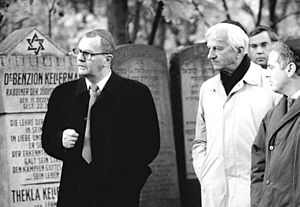
In 1992, Barenboim became the music director of the Berlin State Opera and the Staatskapelle Berlin. He worked hard to keep the unique sound and style of the orchestra. In 2000, he was made the conductor for life of the Staatskapelle Berlin.
In 2006, he became the main guest conductor of La Scala opera house in Milan, Italy. He then became its music director in 2011.
Barenboim has also given special lectures about music. In 2006, he gave the BBC Reith Lectures called In the Beginning was Sound. He also gave the Charles Eliot Norton Lectures at Harvard University.
In 2009, Barenboim conducted the famous Vienna New Year's Concert for the first time. He conducted it again in 2014 and 2022.
In 2014, construction began on the Barenboim–Said Academy in Berlin. This project, which Barenboim started with scholar Edward Said, is a place where young music students from Arab countries and Israel can study music and other subjects together. It opened in 2016.
In 2015, Barenboim showed off a new type of concert grand piano. It was designed to have straight strings, which gives it a very clear sound.
In 2018, Barenboim was the subject of a French cartoon series called Max & Maestro.
In October 2022, Barenboim announced he would be doing fewer concerts because of his health. On 6 January 2023, he resigned as the General Music Director of the Staatsoper Unter den Linden due to health reasons. On 6 February 2025, Daniel Barenboim shared that he has Parkinson's disease.
Musical Approach
Barenboim has his own ideas about how music should be played. He believes that the speed of a piece should come from the music itself, especially its harmonies. He doesn't always agree with playing music exactly as it might have been played hundreds of years ago. He thinks it's important to keep the music alive and connect it to today's world.
For example, when he plays Bach's The Well-Tempered Clavier, he uses the piano's pedals a lot. This creates a rich sound that was not possible on instruments from Bach's time. Barenboim believes that musicians should explore how Bach's music has been played and changed over centuries, rather than just trying to copy the exact sound of the past.
Recordings
Early in his career, Barenboim focused on classical and romantic music. He made his first recording in 1954. He has recorded all of Mozart's and Beethoven's piano sonatas and piano concertos. He also recorded many works by romantic composers like Brahms, Liszt, Chopin, and Mendelssohn.
Barenboim has recorded a lot of chamber music, which is music for a small group of instruments. He often played with his first wife, cellist Jacqueline du Pré, and violinists Itzhak Perlman and Pinchas Zukerman.
As a conductor, he has recorded all the symphonies by Beethoven, Brahms, Bruckner, Schubert, and Schumann. He has also conducted many operas, especially by Richard Wagner.
In recent years, Barenboim has also explored music from the Baroque period and the 20th century. He has even played jazz and the folk music of his home country, Argentina.
To celebrate his 75th birthday, two major music companies released large collections of his recordings.
Playing Wagner in Israel
For a long time, the music of Richard Wagner was not played in Israel. This was because Wagner had written anti-Jewish things, and his music was used by Nazi Germany. This made his music very painful for many Jewish people, especially Holocaust survivors.
Daniel Barenboim has openly disagreed with this unofficial ban since 1989. He believes that Wagner's music should be separated from his personal views and the way the Nazis used it.
In 2001, at a concert in Jerusalem, Barenboim decided to play a piece by Wagner as an extra song. He asked anyone who didn't want to hear it to leave. Some people did leave, but most stayed and applauded. This caused a big discussion in Israel. Some people were very upset, while others supported Barenboim.
Barenboim said he played Wagner to make a point about freedom in music. He believes that not playing Wagner's music in Israel is a sign of deeper problems in society. He has said that people should try to understand different viewpoints.
Working for Peace
Barenboim has often spoken out about the conflict between Israelis and Palestinians. He believes that both peoples deserve to live safely in their own states. He thinks that peace can only happen if both sides understand each other's stories and needs.
The West–Eastern Divan Orchestra
In 1999, Barenboim and Palestinian-American writer Edward Said started the West–Eastern Divan Orchestra. This orchestra brings together young classical musicians from Israel, Palestine, and Arab countries every summer. They study and perform music together. The goal is to help them understand each other better and promote peace through music. Barenboim and Said received an award in 2002 for their work with this orchestra.
In 2005, an Israeli politician criticized Barenboim for his views, calling him "a real Jew hater." Barenboim has always said he wants to help people and promote understanding.
In 2012, the West–Eastern Divan Orchestra was invited to play at the BBC Proms in London. They performed all nine of Beethoven's symphonies. Barenboim was also an Olympic flag carrier at the opening ceremony of the London 2012 Olympic Games.
Wolf Prize
In 2004, Barenboim received the Wolf Prize in Israel. Before the ceremony, an Israeli minister asked him to apologize for playing Wagner's music in Israel. Barenboim said he was sorry if he had hurt anyone, but he didn't think he needed to apologize for his artistic choices. In his acceptance speech, he spoke about the need for justice and peace for both Israelis and Palestinians.
Performing in the West Bank and Gaza Strip
Barenboim has performed several times in the West Bank, including at Bir Zeit University and in Ramallah.
In 2007, he tried to hold a concert in Gaza with musicians from different countries. However, one Palestinian musician was not allowed to enter Gaza. Barenboim canceled the concert in support of the musician, saying that music should not be stopped by politics.
In January 2008, after a concert in Ramallah, Barenboim was given honorary Palestinian citizenship. He said he hoped this would be a sign of peace. Some Israelis criticized his decision, but the government said he would not lose his Israeli citizenship.
In May 2011, Barenboim conducted the "Orchestra for Gaza." This orchestra was made up of musicians who volunteered from famous orchestras around the world. They played a concert in Gaza City for hundreds of schoolchildren and aid workers. Barenboim spoke at the concert, saying that the Palestinian cause is fair, but it must be achieved without violence.
Awards and Recognition
A small planet, 7163 Barenboim, discovered in 1984, is named after him.
Awards and Titles
Barenboim has received many important awards and honors from around the world. These include:
- Grand Cross of the Order of Merit of the Federal Republic of Germany, 2002
- Prince of Asturias Awards, 2002 (with Edward Said)
- Wolf Prize in Arts, 2004 (he donated the money to music education for Israeli and Palestinian youth)
- Ernst von Siemens Music Prize, 2006
- Commander of the Legion of Honour (France), 2007 (later Grand Officier in 2011 and Grand Cross in 2023)
- Praemium Imperiale, 2007
- Royal Philharmonic Society Gold Medal, 2008
- Diamond Konex Award for Classical Music (Argentina), 2009
- Léonie Sonning Music Prize, 2009
- Westphalian Peace Prize, 2010
- Otto Hahn Peace Medal, 2010
- Honorary Knight Commander of the Order of the British Empire (KBE), 2011
- Dresden Peace Prize, 2011
- International Willy-Brandt Prize, 2011
- Voted into the Gramophone Hall of Fame, 2012
- Honorary Member of the Berliner Philharmoniker
- Pour le Mérite for Sciences and Arts, 2015
- Elgar Medal, 2015
- Lifetime Achievement Gramophone Classical Music Awards, 2022
- Honorary citizen of Berlin, 2023
- Grand Cross of the Order of Civil Merit, 2025
Honorary Degrees
He has also received honorary doctorates from many universities, including:
- Hebrew University of Jerusalem, 1996
- University of Oxford, 2007
- Royal Academy of Music, 2010
- Weizmann Institute of Science, 2013
- University of Florence, 2020
Grammy Awards
Barenboim has won 7 Grammy Awards for his recordings:
- For the opera Tannhäuser by Wagner (2003)
- For chamber music with the Berlin Philharmonic (1995)
- For Brahms's Violin Sonatas with Itzhak Perlman (1991)
- For Corigliano's Symphony No. 1 with the Chicago Symphony Orchestra (1992)
- For Richard Strauss Wind Concertos with the Chicago Symphony Orchestra (2002)
- For Elgar's Violin Concerto with Itzhak Perlman and the Chicago Symphony Orchestra (1983)
- For Beethoven's Five Piano Concertos with Arthur Rubinstein and the London Philharmonic Orchestra (1977)
Special Piano
In 2017, Barenboim introduced a new type of concert grand piano. This piano has straight bass strings, unlike most modern pianos that have crossed strings. He was inspired by a piano that the composer Liszt used to play. Barenboim likes this new piano because it gives a very clear sound and allows him to control the tone better. He used this special piano to perform with the Berlin Philharmonic Orchestra in 2019.
See also
 In Spanish: Daniel Barenboim para niños
In Spanish: Daniel Barenboim para niños


